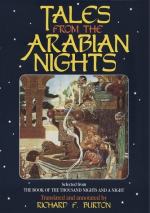[FN#19] The normal phrase on such occasions (there is always a “dovetail” de rigueur) “Allah give thee profit!”
[FN#20] i.e. We are forced to love him only, and ignore giving him a rival (referring to Koranic denunciations of “Shirk,” or attributing a partner to Allah, the religion of plurality, syntheism not polytheism): see, he walks tottering under the weight of his back parts wriggling them whilst they are rounded like the revolving heavens.
[FN#21] Jannat al-Na’im (Garden of Delight); the fifth of the seven Paradises made of white diamond; the gardens and the plurality being borrowed from the Talmud. Mohammed’s Paradise, by the by, is not a greater failure than Dante’s. Only ignorance or pious fraud asserts it to be wholly sensual; and a single verse is sufficient refutation: “Their prayer therein shall be ’Praise unto thee, O. Allah!’ and their salutation therein shall be ‘Peace!’ and the end of their prayer shall be, ’Praise unto God, the Lord of all creatures"’ (Koran x. 10-11). See also lvi. 24- 26. It will also be an intellectual condition wherein knowledge will greatly be increased (lxxxviii viii. 17-20). Moreover the Moslems, far more logical than Christians, admit into Paradise the so-called “lower animals.”
[FN#22] Sed vitam faciunt balnea, vine, Venus! The Hammam to Easterns is a luxury as well as a necessity; men sit there for hours talking chiefly of money and their prowess with the fair; and women pass half the day in it complaining of their husbands’ over-amativeness and contrasting their own chaste and modest aversion to camel congress.
[FN#23] The frigidarium or cold room, coolness being delightful to the Arab.
[FN#24] The calidarium or hot room of the bath.
[FN#25] The Angel who acts door-keeper of Hell; others say he specially presides over the torments of the damned (Koran xliii. 78).
[FN#26] The Door-keeper of Heaven before mentioned who, like the Guebre Zamiyad has charge of the heavenly lads and lasses, and who is often charged by poets with letting them slip.
[FN#27] Lane (i. 616), says “of wine, milk, sherbet, or any other beverage.” Here it is wine, a practice famed in Persian poetry, especially by Hafiz, but most distasteful to a European stomach. We find the Mu allakah of Imr al-Keys noticing “our morning draught.” Nott (Hafiz) says a “cheerful cup of wine in the morning was a favourite indulgence with the more luxurious Persians. And it was not uncommon among the Easterns, to salute friend by saying."May your morning potation be agreeable to you!” In the present day this practice is confined to regular debauchees.
[FN#28] Koran xii. 31. The words spoken by Zulaykha’s women friends and detractors whom she invited to see Beauty Joseph.
[FN#29] A formula for averting fascination. Koran, chaps. cxiii. 1. “Falak” means “cleaving” hence the breaking forth of light from darkness, a “wonderful instance of the Divine power.”




